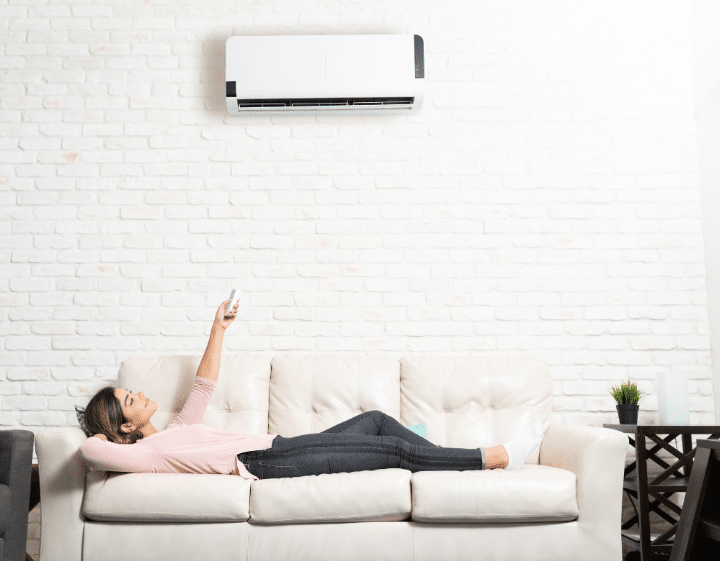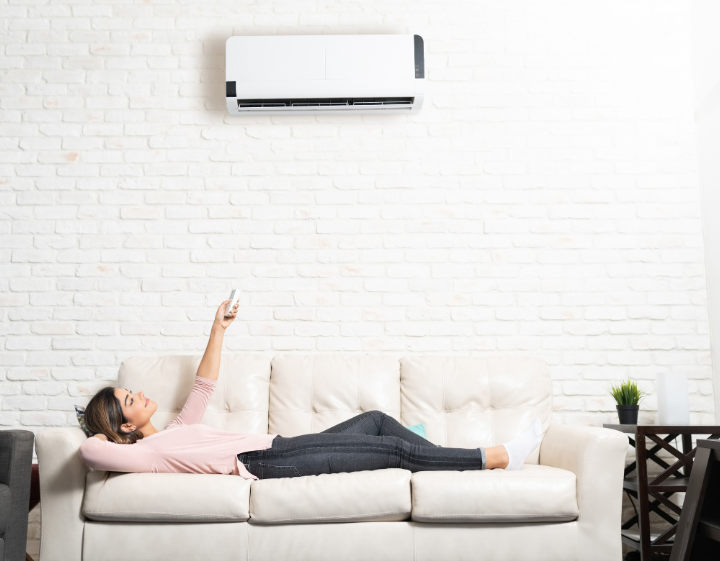Introduction
Mini split heat pumps have emerged as a popular choice for heating and cooling solutions in modern homes. Unlike traditional HVAC systems, mini split heat pumps offer a range of benefits that make them a practical and efficient option for homeowners. This blog post aims to delve into the reasons behind their rising popularity and highlight why they are considered the future of home climate control.
Mini split heat pumps consist of two main components: an outdoor unit and one or more indoor units. These units are connected by refrigerant lines, allowing for customized temperature control in different areas of the house. This versatility is one of the primary reasons why mini split systems are gaining traction among homeowners. Moreover, mini split heat pumps are known for their energy efficiency. They utilize advanced technology, such as inverter-driven compressors, to provide precise and consistent heating and cooling while consuming less energy. This not only results in lower utility bills but also reduces the environmental impact. Another advantage of mini split systems is their ease of installation. They require minimal ductwork, making them ideal for retrofitting existing homes or spaces where ducts are not feasible. Additionally, the absence of ducts eliminates the risk of air leakage, ensuring that the conditioned air reaches the desired area effectively.
Mini split heat pumps offer a multitude of benefits that position them as the future of home climate control. With their customizable temperature control, energy efficiency, and easy installation, they provide homeowners with a cost-effective and practical solution for maintaining optimal comfort throughout the year.
What is a Mini Split Heat Pump?
A mini split heat pump is a type of heating and cooling system that is becoming increasingly popular due to its efficiency and customization features. Unlike traditional HVAC systems, mini split heat pumps do not rely on ductwork to distribute air throughout the home.
Mini split heat pumps consist of two main components: the outdoor compressor/condenser and the indoor air-handling units. The outdoor compressor/condenser is responsible for transferring heat between the indoor and outdoor environments. It contains the compressor, fan, and condenser coil. The indoor air-handling units, also known as evaporators or fan coils, are installed within the home and are connected to the outdoor unit via refrigerant lines. These units distribute the conditioned air directly into the living space. The absence of ductwork in mini split heat pumps eliminates the energy losses associated with ductwork, making them more efficient. Additionally, the ability to have multiple indoor units connected to a single outdoor unit allows for zoning, meaning different areas of a home can be heated or cooled independently. This customization feature allows for greater control over temperature and energy usage, leading to cost savings.
Overall, mini split heat pumps provide a practical, efficient, and cost-effective solution for home heating and cooling, making them a popular choice among homeowners.
Energy Efficiency
Mini split heat pumps are highly energy-efficient heating and cooling solutions that have gained popularity in recent years. Unlike traditional HVAC systems that generate heat, mini split heat pumps work by transferring heat from one place to another. This process requires less energy compared to generating heat, resulting in significant energy savings.
One of the key features that contribute to the energy efficiency of mini split heat pumps is their ability to adjust their output based on the needs of each room. Multiple indoor units are connected to a single outdoor unit, allowing for zoned heating and cooling. Each indoor unit can be controlled independently, enabling users to customize the temperature in different rooms according to their preferences. This not only provides optimal comfort but also reduces energy waste. By heating or cooling only the rooms that are being used, mini split heat pumps help save energy and lower utility bills. For instance, if certain rooms are unoccupied, the system can be adjusted to a lower output or can even be turned off. This level of control ensures that energy is not wasted on heating or cooling unused spaces.
Overall, the energy efficiency of mini split heat pumps, combined with their ability to customize heating and cooling needs for each room, makes them a practical and cost-effective choice for homeowners. These systems not only help reduce energy consumption but also provide a comfortable living environment without compromising on performance.
Flexibility and Scalability
Flexibility and scalability are key advantages of mini split heat pump systems, making them a popular choice for homeowners seeking efficient and customizable heating and cooling solutions. With their modular design, mini split systems can easily accommodate different layouts and building sizes.
One of the main benefits of mini split heat pumps is their ability to be installed in various zones or rooms without the need for extensive ductwork. This flexibility allows homeowners to customize their heating and cooling needs on a room-by-room basis. For example, if a certain area requires more heating or cooling than others, an additional unit can be easily installed, providing optimal comfort and temperature control.
Additionally, mini split systems offer scalability, meaning they can be expanded or adjusted as needed over time. This is especially beneficial for those who plan to renovate or add new spaces to their homes. With minimal installation requirements and the absence of ductwork, adding new units to new areas becomes a hassle-free process.
The flexibility and scalability of mini split heat pump systems make them an excellent choice for homeowners who require efficient, customizable, and cost-effective heating and cooling solutions. Whether it’s accommodating different layouts or expanding to new spaces, mini split systems provide the versatility needed for optimal comfort and temperature control.
Improved Indoor Air Quality
Mini split heat pumps are gaining popularity as an efficient and cost-effective solution for home heating and cooling. One significant advantage of these systems is their ability to greatly improve indoor air quality.
Mini split systems offer multi-stage filtration that effectively reduces dust, bacteria, pollen, and other particulates in the air. This is particularly beneficial for individuals with allergies or respiratory conditions, as the filters help to provide cleaner and healthier indoor air. The filtration process captures and eliminates these contaminants, ensuring that the air circulating in the home is fresher and safer to breathe.
Furthermore, mini split systems do not rely on ductwork to distribute heated or cooled air throughout the home. This lack of ductwork minimizes the risk of contaminants being spread from one area to another. In traditional systems with ducts, dust, allergens, and other particles can accumulate within the ducts and be circulated throughout the house whenever the heating or cooling system is in use. This can lead to poor indoor air quality and potential health issues for the occupants.
Mini split heat pumps offer a practical solution for homeowners looking for efficient and customizable heating and cooling options. The improved indoor air quality provided by these systems, thanks to multi-stage filtration and the absence of ductwork, ensures a healthier and more comfortable living environment.
Zoned Heating and Cooling
Zoned heating and cooling refers to the ability to maintain different temperatures in various parts of the home, allowing personalized comfort and increased efficiency. This concept is central to the popularity and practicality of mini split heat pumps.
With zoned climate control, each room or zone in the house can have its own temperature settings, independent of the others. This means that family members can customize the temperature to their liking, catering to individual needs and preferences. For instance, if one person prefers a cooler sleeping environment while another prefers a warmer living room, zoned heating and cooling can easily accommodate these diverse requirements. Additionally, zoned heating and cooling offers increased efficiency as it allows for the heating or cooling of only the occupied areas of the home. Rather than wasting energy on unused rooms, mini split heat pumps focus on delivering comfort where it is needed. By avoiding the use of central ductwork, these systems minimize energy loss and can effectively provide personalized comfort without driving up utility bills.
Overall, zoned heating and cooling offered by mini split heat pumps provides a practical solution for efficient home comfort. It allows for customizable temperature settings and caters to diverse family needs, all while maximizing energy efficiency and reducing costs.
Ease of Installation
Mini split heat pumps offer homeowners an incredibly easy and hassle-free installation process. Unlike traditional HVAC systems, which can involve extensive ductwork and demolition, mini split systems simply require a small hole to be drilled in the wall for the conduit. This straightforward installation process is not only convenient but also helps reduce the overall cost of installing the system.
One of the main advantages of mini split heat pumps is the speed at which they can be installed. With minimal ductwork and no need to make structural changes to the home, the installation process is relatively quick and efficient. This means homeowners can enjoy the benefits of a mini split system much sooner compared to traditional systems. Additionally, the installation of a mini split heat pump causes minimal disruption to the home. There is no need to tear down walls or disrupt daily activities during the installation process. Homeowners can continue with their routines without any major inconvenience. The ease of installation makes mini split heat pumps a popular choice for homeowners looking for a cost-effective and customizable heating and cooling solution. Whether it’s a single-room application or a whole-home system, mini split heat pumps provide a straightforward installation process that saves time, money, and hassle for homeowners.
Sustainability
Mini split heat pumps are gaining popularity as a sustainable choice for home heating and cooling due to their numerous environmental benefits. These systems contribute to lower carbon emissions and improved energy efficiency, making them a viable option for eco-conscious homeowners.
One of the key environmental advantages of mini split heat pumps is their energy efficiency. These systems are designed to deliver heating and cooling directly to the specific areas where it’s needed, avoiding unnecessary energy waste. By avoiding the need to constantly heat or cool the entire home, mini split heat pumps can significantly reduce energy consumption and carbon emissions, leading to a smaller environmental footprint.
Additionally, newer mini split systems use more environmentally friendly refrigerants. Traditionally used refrigerants, such as R-410A, had high global warming potential. However, newer models are now equipped with refrigerants like R-32, which have a lower Global Warming Potential (GWP) and lower impact on climate change.
Choosing a mini split heat pump for home heating and cooling not only provides efficient and customizable comfort, but it also helps contribute to a more sustainable future. With their improved energy efficiency and use of environmentally friendly refrigerants, mini split heat pumps offer a practical and eco-friendly solution for reducing carbon emissions and minimizing environmental impact.
The Future of Home Climate Control
Advancements in technology are constantly pushing the boundaries of what is possible in the field of home climate control, and this trend is expected to continue in the future. In particular, mini split heat pumps, already known for their efficiency and customizability, will likely see significant improvements.
As technology progresses, we can expect mini split systems to become even more energy-efficient. This will be achieved through the development of more efficient compressor designs, advanced heat exchanger materials, and better control algorithms. These advancements will not only lower energy consumption but also enhance the overall performance of mini split heat pumps. Furthermore, mini split systems are likely to become even more feature-rich. We can expect to see advancements in smart home integration, allowing users to control their mini split heat pumps through voice commands or smartphone apps. Additionally, improvements in air purification and humidity control capabilities are expected, leading to healthier and more comfortable indoor environments. With rising energy costs and tightening environmental regulations, the adoption of efficient home climate control systems like mini splits is almost certain to increase. Their ability to provide cooling and heating on demand, with customizable zones, and with minimal energy waste makes them an attractive option for homeowners and businesses alike.
The future of home climate control looks promising, with mini split heat pumps leading the way. Advancements in technology will continue to enhance their performance and features, making them even more efficient and customizable. As energy costs rise and environmental regulations tighten, the adoption of mini splits is expected to increase, offering homeowners a cost-effective and sustainable solution for their heating and cooling needs.
Conclusion
Mini split heat pumps offer numerous benefits that make them a practical choice for home heating and cooling. Their efficiency, customizability, and cost-effectiveness make them a standout option in the market. With their ability to provide both heating and cooling capabilities, mini split heat pumps offer year-round comfort and convenience.
Unlike traditional HVAC systems, mini splits allow for zoned heating and cooling, giving homeowners greater control over the temperature in different areas of their homes. This not only maximizes energy efficiency but also enhances comfort levels by addressing individual preferences. Furthermore, mini split heat pumps are highly energy-efficient, leading to significant savings on utility bills. They operate using inverter-driven technology that adjusts the system’s output according to the specific needs of the space, resulting in reduced energy consumption. The ease of installation and minimal maintenance requirements of mini split heat pumps make them an attractive choice for homeowners. They are also a great option for retrofitting existing homes that lack ductwork.
Considering these benefits, it is clear why mini split heat pumps are gaining popularity as a viable option for efficient, customizable, and cost-effective home heating and cooling solutions. Whether for new construction projects or retrofitting existing homes, mini split heat pumps offer a reliable and efficient solution for achieving optimal indoor comfort with minimal energy consumption and cost.






